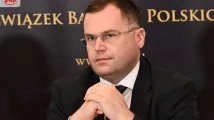US's Bechtel interested in Poland's transportation hub CPK; nuclear project on schedule (interview)

American company Bechtel, which is to build Poland's first nuclear power plant in Pomerania in consortium with Westinghouse, expects EPC contract negotiations to last until the end of the year. The project is on schedule and the work to date has been done below the anticipated budget, Bechtel's president and COO Craig Albert told PAP Biznes. The company is interested in participating in Poland's central transportation hub CPK construction project.
On Monday, Poland signed a bridge agreement (EDA) with US contractors, the Westinghouse - Bechtel consortium, for the construction of country’s first nuclear power plant in Pomerania.
The EDA contract is a bridge agreement between the design contract that 100 percent state-owned SPV Polskie Elektrownie Jadrowe (PEJ) and the Westinghouse - Bechtel consortium signed in 2023 and the comprehensive EPC (Engineering, Procurement, Construction) formula contract.
As reported by PEJ, the bridging agreement (EDA) specifies provisions that guarantee an effective and at the same time legally compliant cooperation between PEJ and the WBC consortium for nine consecutive months.
The conclusion of the EDA contract allows the engineering work on the nuclear power plant project to continue and ensures the transition to the next phases of the project, including the negotiation of the construction contract.
"In the nuclear project in Poland, we are carrying out geotechnical work on site, we have just completed the first phase, and now - thanks to the extension of the contract and the agreement on the EDA bridging agreement, we are continuing more detailed research, which will be completed at the beginning of 2026," Bechtel's COO Albert told PAP Biznes.
"At the same time, we are now entering full engineering works. The main equipment suppliers are already starting design work," he added.
As the COO reported, the ESC (Engineering Services Contract) was concluded for 18 months and has already expired, and the negotiations on the EPC (Engineering, Procurement and Construction) contract will take some time, so a bridging agreement (EDA) was needed.
"It allows us to continue engineering works, perform additional geotechnical surveys and continuing the work according to the schedule. It is positive that we managed to reach an agreement with the new Polish administration," Craig Albert assessed.
"Negotiations on the EPC contract are likely to begin in coming weeks and we expect them to last until the end of the year. It is important that the work is carried out in accordance with the EDA agreement, and we reach all the milestones for the progress of the work," he added.
Bechtel's COO stressed that particular attention should be paid to preventing the slowdown in the entire project.
"We just have to be careful that the slowdown in reaching an agreement on the EPC does not slow down the whole project. The project schedule is the most important," Albert emphasised.
In order to implement the EPC contract, EC approval is needed for state aid for Poland's first nuclear power plant of around PLN 60 billion (EUR 14 bln). The power plant is to have three reactors built with AP1000 technology from the US company Westinghouse with a total capacity of 3.75 GW. In its notification application to the European Commission, the government assessed the cost of the investment at PLN 192 billion (EUR 44.9 bln).
According to assumptions for the update of the Polish Nuclear Power Programme (PPEJ), the first electricity from the first unit of the nuclear power plant is expected to flow in 2036.
"One of the key milestones for the project is to place a full order to equip the nuclear reactor. Another major milestone is for design to have been progressed enough in order to place the first concrete," Bechtel's COO said.
"The project is being implemented according to schedule, and the work carried out so far has been done below the assumed budget. We are satisfied with the progress of the work. We are also involving more and more people in the project, as the pace of work accelerates. We estimate that from the moment the first concrete is poured, the construction will take seven years," he added.
As the COO of US-based Bechtel reported, the group is now drawing up a detailed plan for the performance of the tasks, deciding how the work will be carried out, what work will be outsourced to subcontractors, what the scope of work will be.
"To be able to do this, we need to know the supply chain capabilities. (...) So far, we have met with over 700 companies at Supplier Days - regular events organised by consortium. We will develop a procurement plan and decide what will be done locally, regionally and at the global level," Craig Albert told PAP Biznes.
"We are in the process of this work. We will want the level of local content to be as high as possible. The procurement phase will begin once the EPC contract is signed," he added.
Bechtel's president and chief operating officer stressed that Westinghouse and Bechtel bring more than 140 years of nuclear power experience, and that both groups collaborating in the consortium do not take this project lightly.
"We only undertake projects where we believe that we can make a really big difference, and that is why the construction of the first Polish nuclear power plant is such a priority for us," he said.
BECHTEL INTERESTED IN PARTICIPATING IN CPK CONSTRUCTION PROJECT
Bechtel is a US-based engineering, construction and project management services company. Over 70 years, the company has designed, built or provided construction services for 150 nuclear power plants worldwide. It also has experience in transport infrastructure projects, among others.
As Craig Albert told PAP Biznes, Bechtel is interested in participating in the Poland's central transportation hub CPK construction project.
"We are interested in participating in the project of building the CPK in Poland. We see ourselves in various roles. (...) There are various options, although in this case it would rather be about project management. We could help determine what the best way is," he said.
He added that the company does not currently hold any significant talks with the Polish side on the CPK project but expresses readiness for such talks and interest in participating in the investment.
"In the future, we could also be interested in other infrastructure projects in Poland, but we cannot take on too much. The construction of a nuclear power plant is a huge project, and we want to do it well. We want to build our credibility here. We can enter a project if we think we can help, but we don't want to distract from the nuclear project," Albert stressed.
As he pointed out, the Warsaw office established by the company has a regional function and has become a so-called project implementation centre.
"We do not want it to serve only the nuclear project, because there are great engineers in Poland, there is a good work culture, and this is a huge potential that we want to use. We are already transferring some of the work on the nuclear project from the US to Poland," Bechtel's COO said.
pel/ ao/ han/



